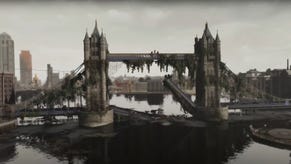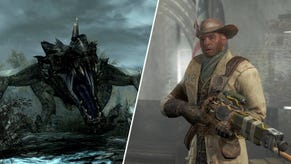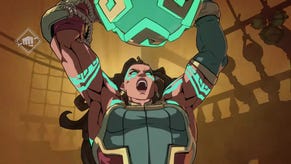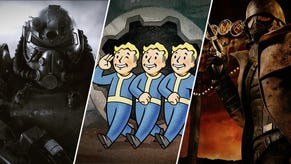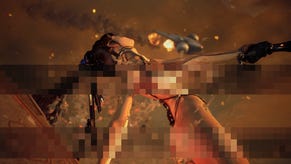Final Fantasy anniversary interview: Toriyama speaks
Final Fantasy turns 25 in December. VG247's Dave Cook spoke with director Motomu Toriyama about its appeal, plus his involvement in 'that' death.
Created by Hironobu Sakaguchi in 1987, the original Final Fantasy was an attempt to reverse the diminishing fortunes of Square. Looking at the past 25 years, it's hard to find another RPG series that has dictated opinion, influenced design and commanded such mastery over technology, regardless of generation.
One man who has seen the lion's share of this journey is current Final Fantasy director Motomu Toriyama. His first game at Square-Enix - then Squaresoft - was Final Fantasy 7. He proved to be a pivotal creative voice in many of the game's most memorable scenes.
Toriyama was originally hired to work on separate RPG license Bahamut Lagoon, a title that was eventually shelved. We ask him what the team felt going into such an ambitious project.
"For the development of Final Fantasy VII, the team was gigantic," Toriyama told us, "and on a much greater scale than for any previous Final Fantasy title, or indeed any other game that had ever been made before."
Unlocking the PSone
Toriyama's team was attempting to make something bold and ambitious in Final Fantasy VII, which was a huge gamble on the emerging PlayStation format. Toriyama revealed that the team's willingness to master the hardware drove them forward.
"At the time I had only just joined the company and was just one of many members of the team," Toriyama explained, "Being able to take part in development on the then revolutionary PSone hardware was an incredibly exciting experience for me."
"At that time the working hours at Squaresoft began at midday so I would be working solidly from noon through to midnight," Toriyama added, "but this was in the emerging golden age of 3D polygon CG based games and every day was filled with new surprises and unforeseen problems making the work very stimulating."
Working hard us one thing, but actually gaining the knowledge needed to make Final Fantasy VII's CGI cut-scenes and slick animation resonate on the screen. Even in 1997 the CG visuals were nothing short of revolutionary.
"Rather than pressure there was more a sense of jubilation at this awesome product that we were creating."
"At the time, games using 3D polygon CG were still pretty rare," Toryiama explained, "so almost every day was filled with endless tests and trials of new techniques. It was an incredibly dynamic development environment with new results and discoveries coming constantly."
"At the start of the development period there were very few graphic artists assigned to the team, so they even had to do their own character animations. That is something which would be unthinkable today."
"All throughout development we could see the evolution of the game taking shape before our eyes so rather than pressure there was more a sense of jubilation at this awesome product that we were creating."
"The 3D effects used in Final Fantasy VII were interesting because although the characters were depicted in full 3D polygons, while the backdrops were only simulated 3D."
"With this system it was very daunting to get the staging on the event scenes right, taking a great deal of ingenuity to make things fit together like with the camera cuts of a movie scene."
"We had to do a great deal of trial and error to get characters looking natural in composition. This was very difficult to achieve visually with the technology available at the time."
Love hurts
Arguably the most memorable and touching story arc in Final Fantasy VII is the growing relationship between Cloud and Aeris. Toriyama had a great hand in writing and directing their scenes together, and of course, the eventual death of Aeris.
"The idea of having Aeris die during the story had a great impact on all the dev staff," Toriyama explained, "and personally I decided to dedicate my efforts to depicting Aeris in as appealing a way as possible, so that she would become an irreplaceable character to the player in preparation for that moment."
"As the game's director Yoshinori Kitase gave a lot of freedom to the dev team," Toriyama added, "so we were entrusted with almost total license to do what we wanted. In order to test the waters and find out where that line was we deliberately went out of our way to do things that we were likely to be asked to remake."
"We were told that having Cloud’s allies from Avalanche merging into Cloud like the party characters did was no good, but that having a homage to the film “Singing in the Rain” where a character dances around a pole was OK."
"Ultimately it may have just been that the line kept out in-joke type references while allowing the more entertaining ideas to go in."
The grand pilgrimage
Final Fantasy VII went on to be a resounding, critically-acclaimed success, and led to the development of the eight and ninth games. But after Final Fantasy IX released, Square began looking at Sony's next console, the PS2.
Never a developer to back down from a fight, Square used Final Fantasy X as a way of squeezing as much power out of Sony's new hardware as possible. The game ripped protagonist Tidus from his world and into a fatal pilgrimage with summoner Yuna.
Toriyama was also promoted to event director on the project, and shared the experience with us. "When the hardware changed to the PS2 we were finally able to have the characters, maps and cameras move freely in a completely 3D environment and also to include full voice, which was a massive revolution for the Final Fantasy series."
"We had strived for a very cinematic game experience up until then, but the technology to get that subtlety of depiction had not been sufficient, and it was with Final Fantasy X I think I can say that we really managed to achieve this."
"The period developing this game was a time of daily challenges and discoveries and again, rather than feeling pressure we were really excited about being able to constantly try out new things."
Sequel schizophrenia
After Final Fantasy X lit up critic pages and retail markets worldwide, Square then decided to make the series' first sequel, the anomaly that is Final Fantasy X-2. Its camp tone and action focus made it a bitter pill for some series fans to swallow.
Toriyama full acknowledges and respects how some people feel, "Final Fantasy X-2 was the first true sequel to any Final Fantasy game, and the with the dawn of the PS2 generation, it became clear that creating a large scale game would require a huge number of staff."
"It is perfectly understandable that from an economic perspective, it is a terrible waste to only use the wealth of graphical assets and the dev environment built up over development for one title and then discard it."
"We decided that even though it was going to be a sequel we would develop Final Fantasy X-2 with a completely new world, story and game systems as only the Final Fantasy series can do."
"Because this was the first ever attempt at a Final Fantasy sequel, we decided to steer ourselves even further along the path of breaking new ground and tried out a much brighter, girlier, pop culture inspired atmosphere than before."
"The final result was very different from the original Final Fantasy X, but I think it is great and somewhat unique that there are fans who can appreciate both titles in their own way."
Unlucky for some
Currently, Toriyama and his team are working on Lighting Returns: Final Fantasy XIII, the final instalment of the Final Fantasy XIII trilogy. Although the series has launched throughout this generation, it was originally planned for PS2.
However - as is tradition in the Final Fantasy series - Square saw new hardware as an inviting challenge, and decided to uproot the game's development and move it over to PlayStation 3.
"The development of Final Fantasy XIII also happened during a time when we were shifting to a new console generation and so to a certain extent had to anticipate that future generation."
"We only really did any development on the PS2 at the very start of the project, and this was mainly focussed around creating the world, and putting together the story and the plot and so on. We also tried out highly action-based game systems."
“The development of Final Fantasy XIII also happened during a time when we were shifting to a new console generation and so to a certain extent had to anticipate that future generation.”
The process proved to be challenging for Toriyama and the rest of Square, as the studio - along with several others - found the PS3 a tricky console to code for. Determined to crack the puzzle, Square opted to create its own development kit Crystal Tools.
Toriyama explained the studio's approach, "When we moved to development for the PS3, I would say that rather than difficulties with the hardware itself, it was actually coming up with the core development setup and philosophy that we spent the most time on."
"Basically, because we proceeded with developing Crystal Tools - not just for Final Fantasy XIII but so we could use it on multiple games - the core development time was extended and became very long. These tools obviously had to work with many different game specifications if they were to be applicable to multiple titles."
Toriyama added that Square took a long-term approach to Crystal Tools, rather than focusing on one project, "Actually laying down the basic specs for the game took a while too and there were many little factors that needed tuning throughout the project."
"Our experiences here were all used as feedback to aid in our development plans for the next generation change, and have already been utilised in creating the dev environment for our new recently announced Luminous Engine.
Critical reaction
Technical power alone doesn't make for a solid experience, and Toriyama's attempt at a more story-driven title let to a mixed reaction from long-time fans. The linear approach was an attempt to craft a stronger plot, but some found it hard to accept.
Toriyama explained, "The core concept behind Final Fantasy XIII was that it would be story driven, and great importance was placed on making sure that anyone would be able to enjoy a high quality game experience to the same level."
"With game design there is always an aspect of cutting away at some features while expanding on others. I do not think we will use exactly the same design in the next games we make, but we managed to achieve a quality that could only be realised with Final Fantasy XIII, so I think there were many positive aspects to it too."
“As this is the third title on the current generation hardware it will also be the most complete and polished game in the Final Fantasy series.”
With lessons learned, Toriyama is happy to share with us more details on Lightning Returns: Final Fantasy XIII, "It is the newest instalment in the Lightning saga that began with Final Fantasy XIII and also brings the saga to a conclusion. In the game Lightning will enter the final battle against a fate brought about by a new deity."
"It will feature direct action battles perfectly suited to Lightning, as well as character customisation, and will really take care to thoroughly embody the character of Lightning herself. The game concept will be very much “world driven” this time round."
"We are going to build a finely detailed world which changes in real time along with the passing of day and night over 24 hours. The world also has links to our own real world, and will see setups with the world of Final Fantasy entering into our everyday lives."
"As this is the third title on the current generation hardware it will also be the most complete and polished game in the Final Fantasy series. The game is scheduled for release in 2013 so look out for it."
How to survive this long
So that's how the Final Fantasy series got to where it is today, but we ask Toriyama why he feels it has stood the test of time and remained as popular as it has these past 25 years.
"I am very glad that we have managed to reach 25 years of Final Fantasy and this is without doubt down to the support of all the fans," Toriyama added, "Each Final Fantasy title is created as a completely new and unique game experience, with new worlds, characters, stories and game systems."
”The biggest concern we are facing is that as the series gets older the fans will increasingly be spread across an even wider demographic. The way they play the games is also changing and presents new challenges in creating a game that can appeal to, and satisfy an increasingly broad and varied audience.”
"I do not think there are any other series out there that have such change and evolution between each title. Sometimes the level of change in a new Final Fantasy game may be quite extreme, but I feel that one reason for the continued popularity of the series among each generation of fans is down to this ideology of challenging ourselves for each new game on the latest hardware of the time."
The hardware angle, again, is key, and pushing that tech is the fundamental value shared across the studio, "From the technical perspective, each time there is a switch to a new generation of gaming hardware there are more new elements and factors that we have to address in creating a Final Fantasy game, so yes that is very tough."
"Of course, on the other hand, there is a massive feeling of achievement and satisfaction when we manage to create a fresh vibe and a more polished product, thanks to improvements in quality due to the appearance of new technology during the development process."
"At the moment the biggest concern we are facing is that as the series gets older the fans will increasingly be spread across an even wider demographic. The way they play the games is also changing and presents new challenges in creating a game that can appeal to, and satisfy an increasingly broad and varied audience."
"Even with those challenges though, I really like the way that we have not lost the spirit of striving for the very best product when making new Final Fantasy games."
Toryiama's favourite moment
We simply have to use this opportunity to ask Toriyama what his most favourite moment from across the Final Fantasy series is and why. It's certainly not an easy thing to narrow down, but he managed it.
"My own personal favourite moment from the series is the opening scene of FFVII," Toryima revealed, "One reason I remember it is that during development on the game, I had to sit in front of a debugging kit, watching that scene many, many times."
"But more than that I feel that the sequence of events in this particular scene, where the speeding train pulls into Midgar Station, and then seamlessly links to the protagonist Cloud leaping down to immediately be controlled by the player, encapsulates the fundamental shared design philosophy behind every Final Fantasy game."
"It's where the games creators show the player the world that they want to while ultimately leaving the glory of the starring role to the player and allowing them to have a game experience. I will try my hardest to continue creating many moments like this that will stay in player’s memories."
"Finally, I would once again like to offer my thanks to all of the fans who have supported Final Fantasy over it’s 25 years and hope we can have lots more fun in the future too."











